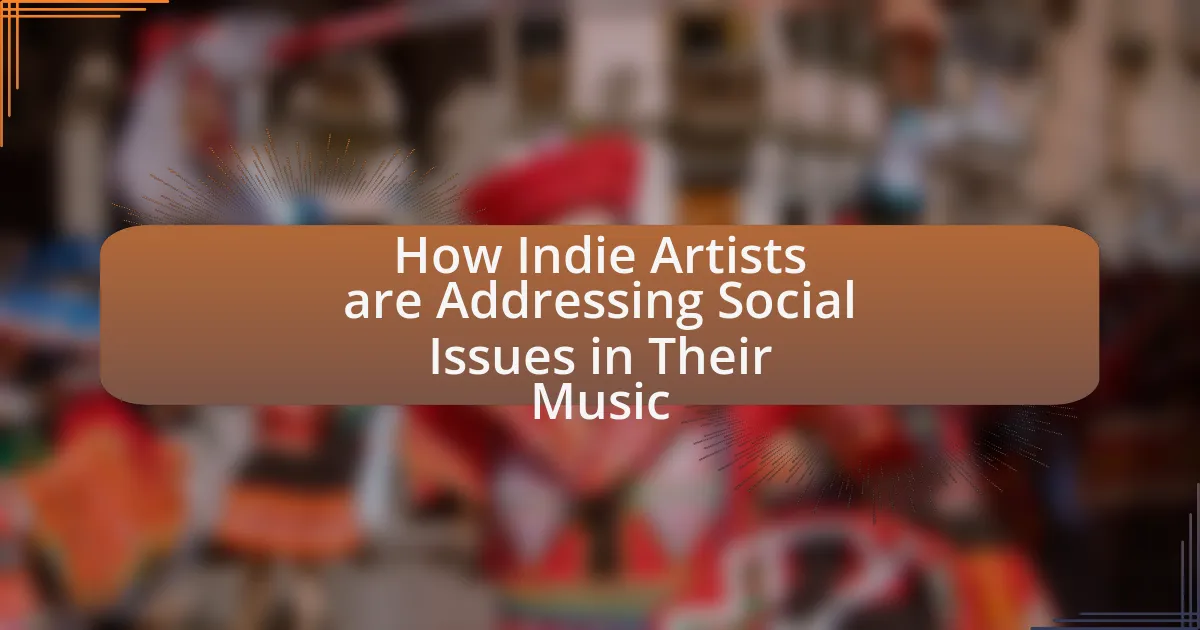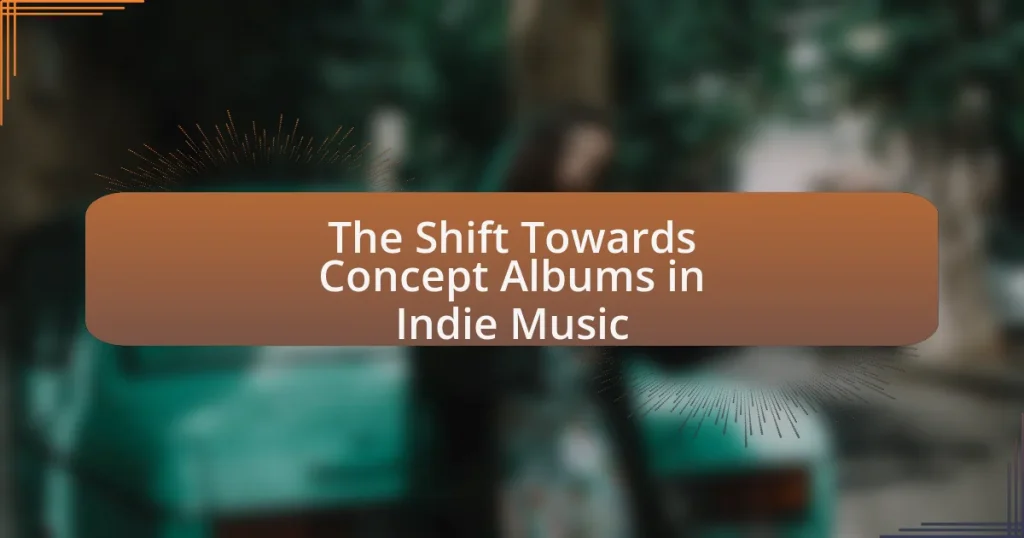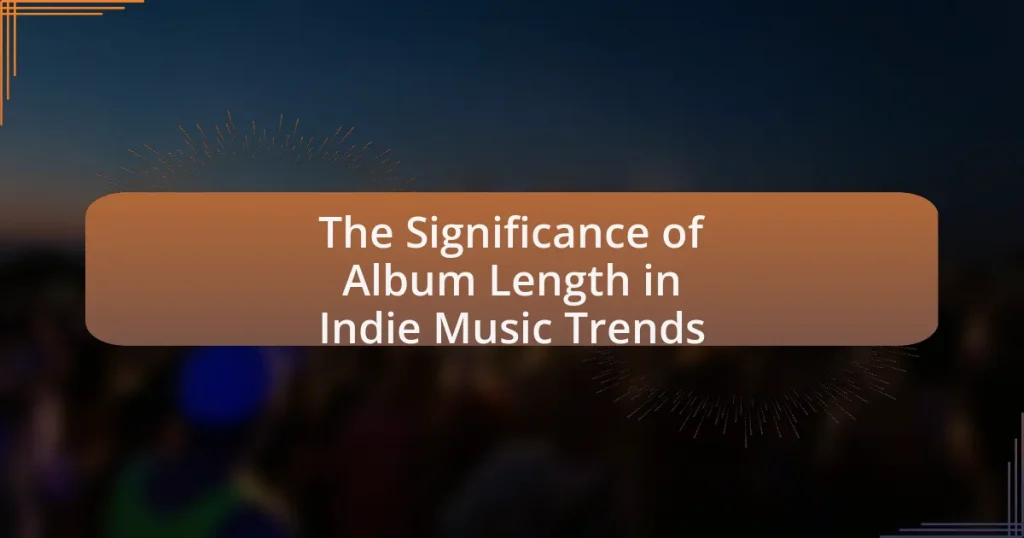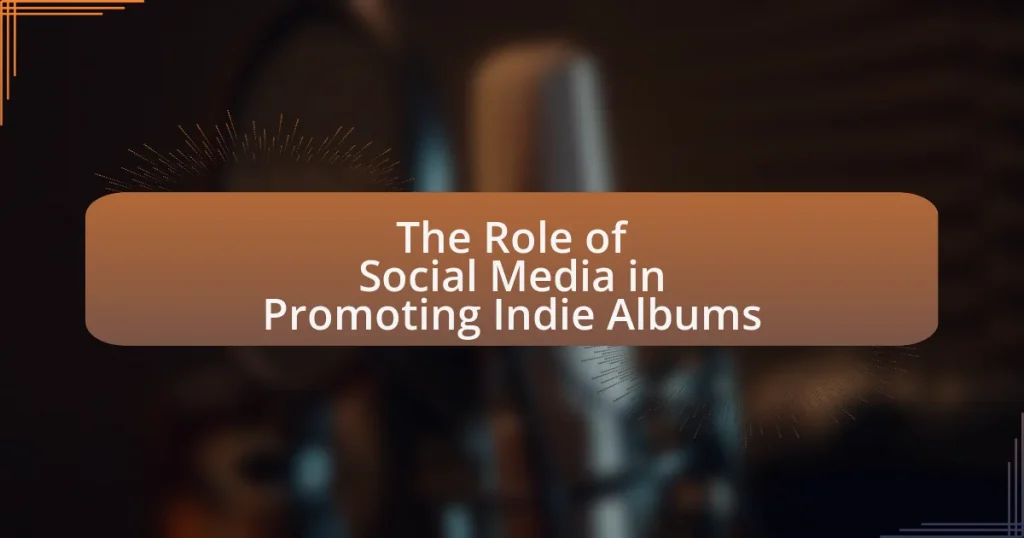Indie artists are increasingly using their music as a platform to address pressing social issues, including mental health, inequality, and environmental concerns. Prominent figures such as Hozier and Billie Eilish exemplify this trend by incorporating themes of social justice and personal experiences into their lyrics, fostering community engagement and activism. The article explores how these artists choose specific issues to focus on, the impact of social themes on their music style, and the effectiveness of music as a medium for raising awareness. Additionally, it discusses the challenges indie artists face, including financial constraints and potential backlash, while highlighting notable examples of their contributions to social activism through music.
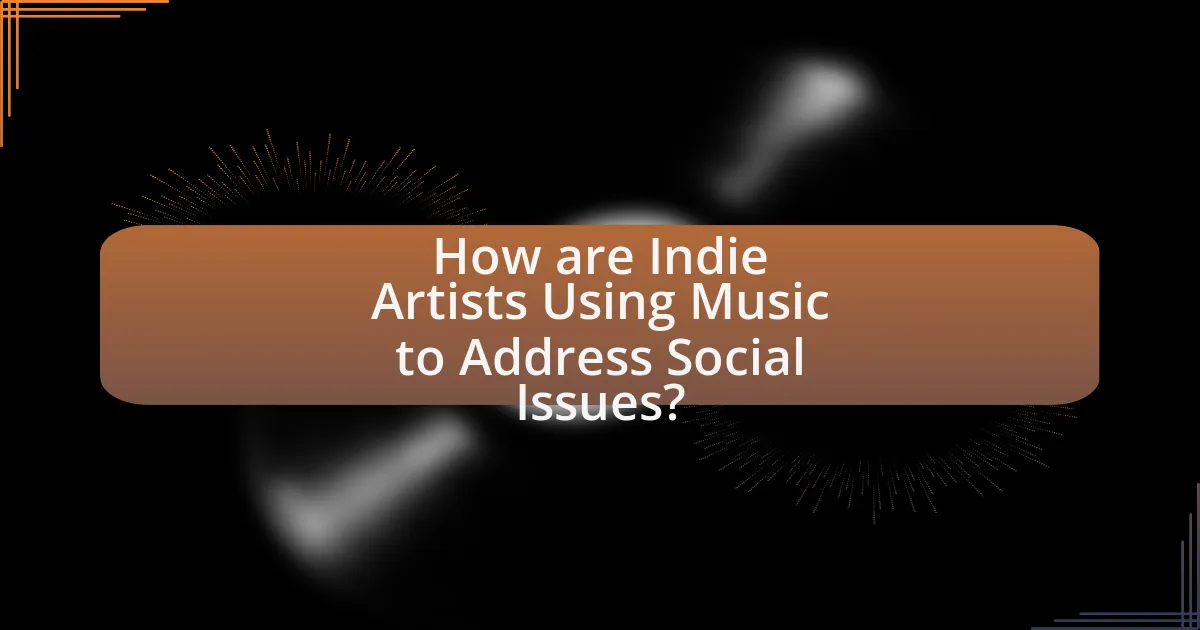
How are Indie Artists Using Music to Address Social Issues?
Indie artists are using music to address social issues by creating songs that reflect personal experiences and societal challenges, often focusing on themes such as inequality, mental health, and environmental concerns. For instance, artists like Hozier and Billie Eilish have incorporated messages about climate change and mental health awareness into their lyrics, resonating with audiences and sparking conversations. Research indicates that music can serve as a powerful medium for social change, as it not only raises awareness but also fosters community engagement and activism, exemplified by movements like Black Lives Matter, where artists have contributed songs that amplify the message of racial justice.
What social issues are commonly addressed by indie artists?
Indie artists commonly address social issues such as mental health, inequality, environmental concerns, and political activism. For instance, many indie musicians create songs that explore the struggles of mental health, reflecting the rising awareness and stigma reduction surrounding this topic. Additionally, issues of social inequality, including race and gender disparities, are frequently highlighted in their lyrics, as seen in the works of artists like Hozier and Janelle Monáe. Environmental themes are also prevalent, with artists using their platforms to advocate for climate action, as demonstrated by bands like The 1975. Furthermore, political activism is a significant focus, with indie artists often critiquing government policies and societal norms, which can be observed in the music of artists like Fiona Apple and Billie Eilish. These examples illustrate how indie artists engage with pressing social issues, making their music a vehicle for awareness and change.
How do indie artists choose which social issues to focus on?
Indie artists choose social issues to focus on based on personal experiences, cultural context, and audience resonance. These artists often draw inspiration from their own lives, societal observations, and the issues that impact their communities, leading to a more authentic connection with their music. For instance, a study by the University of Southern California found that artists who engage with social issues often do so to reflect their values and beliefs, which can enhance their artistic expression and audience engagement. This approach allows indie artists to create music that not only entertains but also raises awareness and fosters dialogue around important social topics.
What impact do these social issues have on their music style?
Social issues significantly influence the music style of indie artists by shaping their lyrical content, instrumentation, and overall themes. For instance, artists often incorporate social justice themes, such as inequality and mental health, into their lyrics, which can lead to a more introspective and poignant sound. This is evident in the rise of genres like folk-punk and socially conscious hip-hop, where the music serves as a platform for activism. Additionally, the instrumentation may reflect cultural influences or historical contexts related to these issues, creating a unique sound that resonates with listeners. The impact is further validated by the increasing popularity of songs that address social issues, as seen in charts and streaming platforms, indicating a strong connection between societal concerns and musical expression.
Why is music an effective medium for addressing social issues?
Music is an effective medium for addressing social issues because it has the power to evoke emotions, foster connection, and raise awareness among diverse audiences. Through lyrics and melodies, artists can convey complex social messages in a relatable manner, making difficult topics more accessible. For instance, songs like “Fight the Power” by Public Enemy have historically galvanized movements against racial injustice, illustrating how music can inspire activism and social change. Additionally, studies show that music can enhance empathy and understanding, as it often reflects personal experiences and societal struggles, thereby encouraging listeners to engage with social issues on a deeper level.
How does music evoke emotional responses related to social issues?
Music evokes emotional responses related to social issues by using lyrical content, melodies, and rhythms that resonate with listeners’ experiences and feelings. For instance, songs addressing themes like inequality or injustice often incorporate powerful narratives that reflect societal struggles, enabling listeners to connect emotionally. Research indicates that music can activate brain regions associated with emotion, such as the amygdala, enhancing empathy and awareness of social issues. A notable example is the song “Alright” by Kendrick Lamar, which became an anthem for the Black Lives Matter movement, illustrating how music can galvanize emotional responses and inspire social change.
What role does storytelling play in indie music addressing social issues?
Storytelling in indie music serves as a powerful tool for addressing social issues by conveying personal narratives that resonate with listeners. Through detailed lyrics and emotive melodies, indie artists often explore themes such as inequality, mental health, and environmental concerns, making complex social topics more relatable. For instance, artists like Sufjan Stevens and Phoebe Bridgers use storytelling to reflect on personal experiences that mirror broader societal challenges, effectively bridging the gap between individual struggles and collective issues. This narrative approach not only fosters empathy but also encourages dialogue around these critical topics, demonstrating the significant impact of storytelling in promoting social awareness within the indie music genre.
How do indie artists engage their audience on social issues?
Indie artists engage their audience on social issues primarily through their music, lyrics, and social media platforms. By incorporating themes of social justice, mental health, and political activism into their songs, these artists create a dialogue that resonates with listeners. For instance, artists like Hozier and Billie Eilish have addressed topics such as climate change and mental health in their lyrics, prompting discussions among fans. Additionally, indie artists often utilize social media to share personal stories, promote awareness campaigns, and connect with their audience on these issues, fostering a sense of community and activism. This approach not only amplifies their message but also encourages listeners to reflect on and engage with the social issues presented.
What platforms do indie artists use to share their messages?
Indie artists primarily use social media platforms, streaming services, and personal websites to share their messages. Platforms like Instagram, Twitter, and Facebook allow artists to engage directly with their audience, while streaming services such as Spotify and Bandcamp provide a means to distribute their music widely. Additionally, personal websites serve as a hub for artists to showcase their work, share blog posts, and connect with fans. These platforms enable indie artists to address social issues effectively by reaching diverse audiences and fostering community engagement.
How do live performances enhance the message of social issues?
Live performances enhance the message of social issues by creating an immersive experience that fosters emotional connection and engagement among the audience. This direct interaction allows artists to convey their messages more powerfully, as the energy and atmosphere of a live setting amplify the emotional weight of the issues being addressed. For instance, during live concerts, artists often share personal stories or contextualize their songs, which can lead to increased awareness and empathy regarding social issues such as inequality or mental health. Research indicates that live music events can significantly influence audience attitudes and behaviors, as seen in studies where attendees reported heightened awareness of social causes after participating in live performances that addressed these topics.
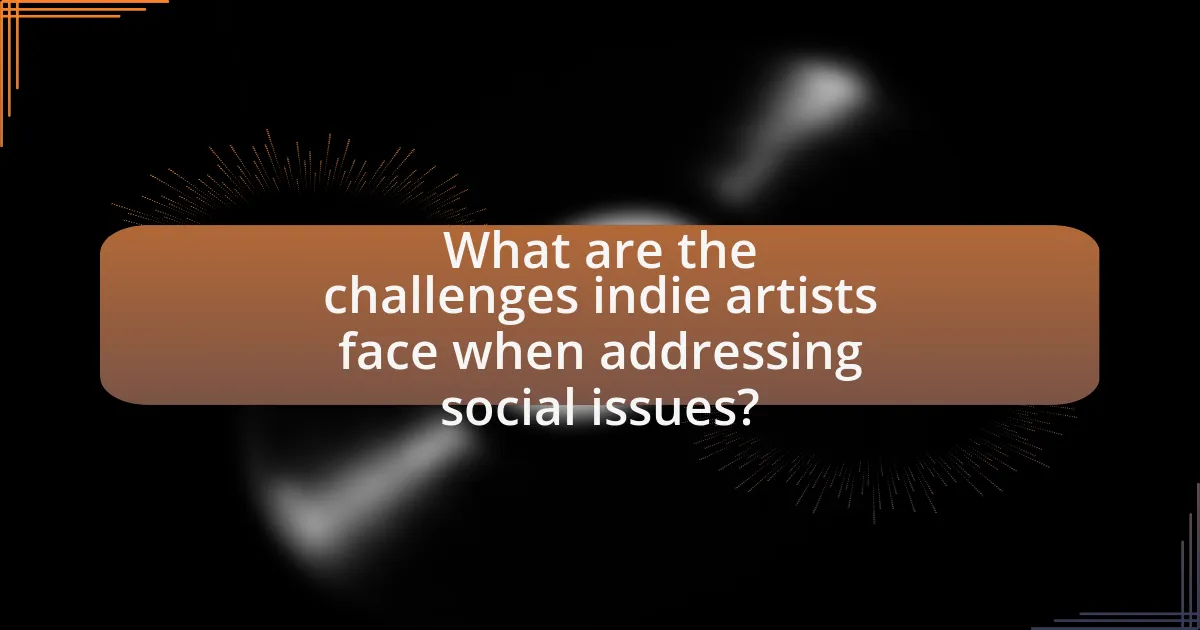
What are the challenges indie artists face when addressing social issues?
Indie artists face significant challenges when addressing social issues, primarily due to limited resources and exposure. These artists often lack the financial backing and marketing power of major labels, which restricts their ability to reach wider audiences and effectively communicate their messages. Additionally, indie artists may encounter resistance from audiences who are not receptive to social commentary in music, leading to potential backlash or alienation. Furthermore, the risk of being pigeonholed into specific genres or themes can limit their creative expression and willingness to tackle complex social issues. These challenges are compounded by the competitive nature of the music industry, where mainstream narratives often overshadow independent voices.
How do financial constraints affect indie artists’ ability to address social issues?
Financial constraints significantly limit indie artists’ ability to address social issues through their music. These artists often operate on tight budgets, which restricts their access to resources such as professional recording studios, marketing, and distribution channels. For instance, a study by the Future of Music Coalition found that 70% of independent musicians reported financial challenges that hindered their creative output and social engagement. Consequently, without adequate funding, indie artists may struggle to produce high-quality content that effectively communicates their messages on social issues, ultimately reducing their impact and reach within the community.
What funding options are available for indie artists tackling social issues?
Indie artists tackling social issues can access various funding options, including grants, crowdfunding, and sponsorships. Grants from organizations like the National Endowment for the Arts or local arts councils specifically support projects addressing social themes. Crowdfunding platforms such as Kickstarter and Indiegogo allow artists to raise funds directly from supporters who resonate with their cause. Additionally, sponsorships from businesses or nonprofits interested in social impact can provide financial backing for projects that align with their values. These funding avenues enable indie artists to create impactful work that addresses pressing social issues.
How do indie artists balance commercial success with social messaging?
Indie artists balance commercial success with social messaging by strategically integrating their values into their music while appealing to a broader audience. They often create relatable content that resonates with listeners’ experiences, allowing them to maintain authenticity without sacrificing marketability. For instance, artists like Hozier and Billie Eilish have successfully addressed social issues such as climate change and mental health in their lyrics, which not only reflect their personal beliefs but also attract a diverse fan base. This dual approach is supported by data indicating that 70% of consumers prefer brands that align with their values, demonstrating that social messaging can enhance commercial appeal.
What backlash do indie artists encounter when addressing controversial issues?
Indie artists encounter significant backlash when addressing controversial issues, often manifesting as public criticism, social media backlash, and potential alienation from certain fan bases. This backlash can stem from differing political views, cultural sensitivities, or the perceived inappropriateness of the subject matter. For instance, artists like Hozier and Billie Eilish have faced criticism for their outspoken views on topics such as climate change and mental health, which some fans may find polarizing. Additionally, the risk of losing commercial opportunities or facing censorship from platforms that prefer neutral content further complicates their efforts to engage with these issues.
How do artists navigate criticism from audiences or industry stakeholders?
Artists navigate criticism from audiences or industry stakeholders by actively engaging with feedback and adapting their work accordingly. They often analyze the criticism to identify constructive elements that can enhance their artistic expression, while also maintaining their unique voice. For instance, indie artists frequently utilize social media platforms to communicate directly with their audience, allowing for real-time dialogue and clarification of their artistic intentions. This approach not only fosters a sense of community but also helps artists to gauge public sentiment and adjust their messaging or style if necessary. Research indicates that artists who embrace feedback and demonstrate responsiveness tend to build stronger connections with their audience, ultimately leading to greater support and understanding of their work.
What strategies do indie artists use to remain authentic despite backlash?
Indie artists use several strategies to remain authentic despite backlash, including staying true to their personal narratives, engaging directly with their audience, and leveraging social media for transparent communication. By focusing on their unique stories and experiences, these artists cultivate a genuine connection with listeners, which helps them maintain authenticity even when facing criticism. For instance, artists like Hozier and Billie Eilish have openly addressed social issues in their music, reinforcing their commitment to authenticity. Additionally, by using platforms like Instagram and Twitter, indie artists can share their thoughts and respond to backlash in real-time, fostering a sense of community and support among their fans. This direct engagement not only helps them navigate criticism but also strengthens their artistic integrity.
How do indie artists collaborate to amplify their social messages?
Indie artists collaborate to amplify their social messages through joint projects, community events, and social media campaigns. By working together on music tracks or albums, they can combine their unique perspectives and reach a broader audience, enhancing the impact of their messages. For instance, collaborations often involve artists from diverse backgrounds, which can highlight various social issues, such as racial equality or environmental concerns. Additionally, community events, such as benefit concerts, allow indie artists to engage directly with their audience while raising awareness and funds for specific causes. Social media campaigns further extend their reach, enabling artists to share their messages widely and mobilize support. This collaborative approach has been effective in movements like Black Lives Matter, where numerous indie musicians have united to promote awareness and action through their art.
What are the benefits of collaboration among indie artists on social issues?
Collaboration among indie artists on social issues enhances visibility, fosters community engagement, and amplifies diverse voices. By working together, indie artists can pool their resources and audiences, leading to greater outreach and impact on social issues. For instance, collaborative projects often result in unique artistic expressions that resonate more deeply with audiences, as seen in initiatives like the “Songs for Social Change” project, which brought together various indie musicians to address climate change. This collective effort not only raises awareness but also encourages listeners to engage with the issues presented, demonstrating the power of unity in artistic expression.
How do partnerships with organizations enhance their impact?
Partnerships with organizations enhance the impact of indie artists by providing resources, visibility, and collaborative opportunities that amplify their message. For instance, when indie artists partner with non-profits focused on social issues, they gain access to established networks and platforms that can reach wider audiences. This collaboration often results in joint campaigns or events that not only promote the artist’s music but also raise awareness and funds for the cause. Research indicates that such partnerships can lead to increased engagement, as seen in the collaboration between artists and organizations like Musicians on Call, which connects musicians with patients in healthcare settings, demonstrating a tangible impact on community well-being.
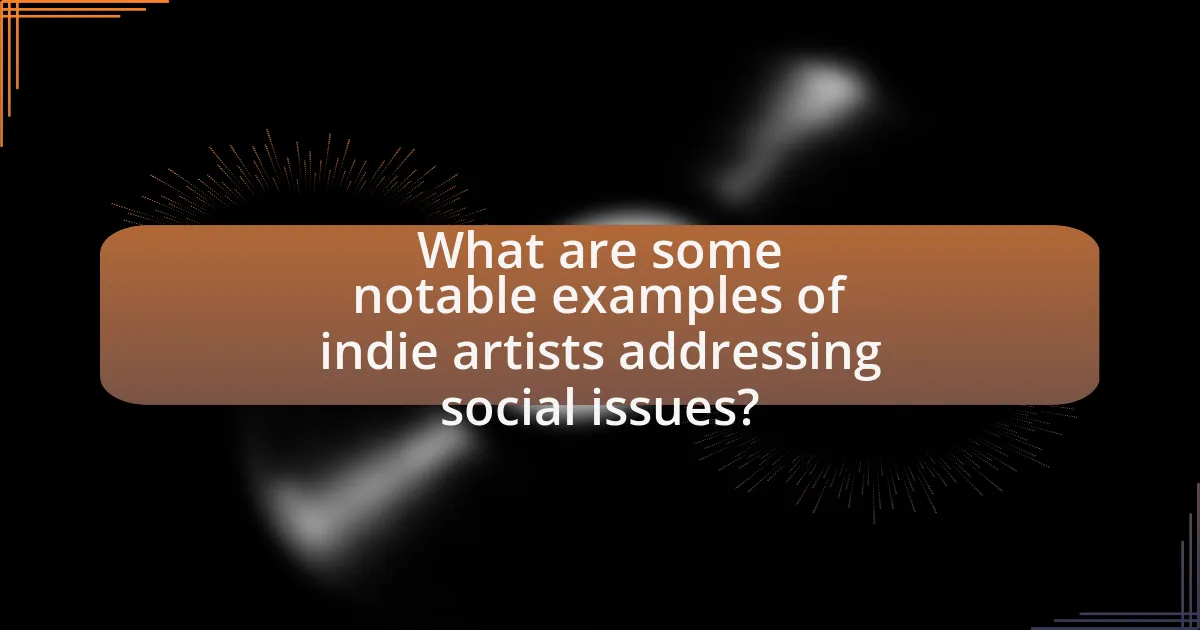
What are some notable examples of indie artists addressing social issues?
Notable examples of indie artists addressing social issues include Hozier, who tackles themes of social justice and rights in his song “Take Me to Church,” highlighting the struggles faced by marginalized communities. Another example is Phoebe Bridgers, whose music often reflects mental health issues and personal trauma, resonating with listeners who face similar challenges. Additionally, the band The 1975 addresses climate change and political activism in their work, particularly in songs like “Love It If We Made It,” which critiques societal apathy towards pressing global issues. These artists use their platforms to raise awareness and provoke thought on significant social matters.
Who are some influential indie artists known for their social activism?
Some influential indie artists known for their social activism include Billie Eilish, who has used her platform to advocate for climate change awareness and mental health issues, and Hozier, recognized for his support of rights and social justice movements. Additionally, Phoebe Bridgers has been vocal about mental health and sexual assault awareness, while Sufjan Stevens has addressed issues such as gun control and immigration through his music. These artists not only create impactful music but also engage in activism that resonates with their audiences, demonstrating the intersection of art and social responsibility.
What specific social issues have these artists addressed in their music?
Indie artists have addressed specific social issues such as mental health awareness, racial inequality, environmental concerns, and gender identity in their music. For instance, artists like Sufjan Stevens have tackled mental health through introspective lyrics, while Hozier has highlighted racial injustice in songs like “Take Me to Church,” which critiques homophobia and systemic oppression. Additionally, artists like Billie Eilish have raised awareness about climate change and its impact on future generations, reflecting a growing concern for environmental issues. These examples illustrate how indie musicians use their platforms to engage with and comment on pressing social issues.
How have their contributions influenced public perception of these issues?
Indie artists have significantly influenced public perception of social issues through their music by raising awareness and fostering dialogue. For instance, artists like Hozier and Billie Eilish have tackled topics such as mental health and climate change in their lyrics, which resonate with listeners and encourage them to engage with these issues. Research indicates that music can shape attitudes and beliefs; a study published in the Journal of Music and Social Behavior found that songs addressing social justice themes can lead to increased activism among listeners. This demonstrates that the contributions of indie artists not only highlight important social issues but also motivate audiences to reflect and act on them.
What songs or albums have made a significant impact on social issues?
Songs and albums that have made a significant impact on social issues include “Fight the Power” by Public Enemy, which addresses racial inequality and empowerment, and “Alright” by Kendrick Lamar, which became an anthem for the Black Lives Matter movement. Additionally, “The Miseducation of Lauryn Hill” by Lauryn Hill tackles themes of identity and feminism, influencing discussions around gender and race. These works have not only resonated with audiences but also sparked conversations and movements, demonstrating the power of music in advocating for social change.
How did these works resonate with audiences and provoke change?
Indie artists addressing social issues in their music resonate with audiences by fostering emotional connections and raising awareness about critical topics. For instance, songs that tackle themes like mental health, racial injustice, or environmental concerns often lead to increased public discourse and community engagement. A notable example is the song “This Is America” by Childish Gambino, which sparked conversations about gun violence and systemic racism, leading to protests and movements advocating for change. Such works not only reflect societal sentiments but also inspire listeners to take action, thereby provoking tangible change in their communities.
What recognition or awards have these works received for their impact?
Indie artists addressing social issues in their music have received various recognitions and awards, including the Grammy Award for Best Americana Album, which recognizes impactful works that often tackle social themes. For instance, artists like Brandi Carlile have won this award for albums that highlight issues such as rights and mental health awareness. Additionally, the Independent Music Awards celebrate indie artists who create music with a social conscience, further validating the impact of their work on societal issues. These awards serve as proof of the significant influence indie music has in raising awareness and fostering dialogue around critical social topics.
How can aspiring indie artists effectively address social issues in their music?
Aspiring indie artists can effectively address social issues in their music by incorporating authentic narratives and personal experiences that resonate with their audience. By drawing from real-life events and societal challenges, artists can create relatable lyrics that provoke thought and inspire action. For instance, artists like Hozier have tackled themes of social justice and inequality in their songs, which not only reflect personal beliefs but also engage listeners in broader conversations. Additionally, collaborating with organizations or movements related to specific social issues can amplify their message and reach a wider audience, as seen with artists who partner with charities to raise awareness through their music.
What best practices should they follow when writing socially conscious music?
Indie artists should prioritize authenticity and research when writing socially conscious music. Authenticity ensures that the message resonates genuinely with listeners, while thorough research provides a solid foundation for the issues being addressed. For instance, artists like Billie Eilish have effectively used personal experiences and factual data to highlight mental health issues, which enhances the credibility of their message. Additionally, incorporating diverse perspectives can enrich the narrative, as seen in the works of artists like Hozier, who draws on historical and cultural contexts to address social justice themes. This approach not only informs the audience but also fosters a deeper connection to the music.
How can they leverage social media to promote their messages?
Indie artists can leverage social media to promote their messages by creating engaging content that resonates with their audience and encourages sharing. By utilizing platforms like Instagram, Twitter, and TikTok, artists can reach a wider audience through visually appealing posts, storytelling, and interactive features such as polls and Q&A sessions. For instance, a study by the Pew Research Center found that 72% of the public uses social media, making it an effective tool for artists to connect with fans and raise awareness about social issues. Additionally, artists can collaborate with influencers or other musicians to amplify their reach, as partnerships can introduce their messages to new audiences.
